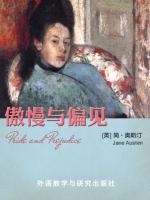A Literary Review
用户750791
**Introduction:** Jane Austen's "Pride and Prejudice," first
published in 1813, stands as a cornerstone of English literature. Its
enduring popularity is a testament to Austen's genius in capturing the
complexities of love, marriage, and society with wit, humor, and
empathy. This review delves into the novel's narrative style, themes,
character development, and literary significance. **Narrative Style:**
Austen's narrative style in "Pride and Prejudice" is both
elegant and accessible. Written in the third person, the novel often
focuses on Elizabeth's perspective, allowing readers to engage closely
with her thoughts and emotions. Austen's use of free indirect discourse,
a technique that blends third-person narration with first-person
thoughts, brings readers into Elizabeth's inner world without breaking
the narrative flow. This style is particularly effective in portraying
Elizabeth's wit, her evolving feelings towards Darcy, and her
reflections on the societal pressures she faces. Its clarity and irony
mark Austen's prose and sharp social commentary, making the novel as
enjoyable today as it was over two centuries ago. **Themes:** 1.
**Social Class and Marriage:** "Pride and Prejudice" is deeply
concerned with the social structures of Regency England, particularly
the institution of marriage. Austen critiques the mercenary nature of
marriage arrangements, as seen in characters like Charlotte Lucas, who
marries the obsequious Mr. Collins out of practicality rather than love.
The novel explores how class influences relationships and personal
happiness, ultimately advocating for marriages based on mutual respect
and affection. 2. **Pride and Prejudice:** As the title suggests,
the themes of pride and prejudice are central to the novel. Elizabeth's
prejudice against Darcy's apparent arrogance clouds her initial judgment
of him, while Darcy's pride leads him to dismiss those he deems socially
inferior. The novel charts their journey towards self-awareness and
humility, highlighting the dangers of allowing these flaws to cloud
one's judgment. 3. **Family and Reputation:** The Bennet family dynamic
plays a significant role in the novel, with each member's behavior
affecting the family's social standing. Mrs. Bennet's embarrassing
pursuit of suitors for her daughters, Lydia's reckless elopement, and
Mr. Bennet's neglect of his parental duties all serve as critiques of
family responsibility and the impact of individual actions on collective
reputation. 4. **Individuality vs. Social Expectations:** Elizabeth
Bennet stands out as a character who values her convictions over
societal expectations. Her refusal of Mr. Collins's proposal, despite
its security, and her initial rejection of Darcy's first proposal
reflect her desire for authenticity in her relationships. Austen
celebrates Elizabeth's independence, even as she navigates the
constraints of her society. **Character Development:** **Elizabeth
Bennet:** Elizabeth is the novel's heroine, known for her intelligence,
wit, and strong moral compass. Throughout the story, she learns to
balance her independent spirit with the realities of her world, leading
to her eventual understanding and acceptance of Darcy. Elizabeth's
character development is central to the novel's exploration of pride,
prejudice, and the complexities of human relationships. **Fitzwilliam
Darcy:** Initially introduced as aloof and arrogant, Mr. Darcy's
character gradually unfolds to reveal a man of deep integrity and
sensitivity. His transformation, driven by his love for Elizabeth and
her candid rejection of his initial proposal, underscores the novel's
theme of personal growth. Darcy's character arc is one of the most
compelling in literature, as he moves from a figure of disdain to one of
profound respect and admiration. **Supporting Characters:** The novel
has a rich cast of supporting characters, each contributing to its
themes and narrative. Jane Bennet's kindness contrasts with Elizabeth's
sharpness, Mr. Bennet's cynicism reflects the pitfalls of disengagement,
and Lydia's recklessness highlights the dangers of unchecked youthful
exuberance. Characters like Lady Catherine de Bourgh and Mr. Collins
offer a satirical look at the absurdities of class and social ambition.
**Literary Significance:** "Pride and Prejudice" is a
cornerstone of English literature, celebrated for its incisive social
commentary and masterful depiction of character. Austen's exploration of
the complexities of love, marriage, and society remains relevant today
as readers continue to find resonance in Elizabeth's journey towards
self-discovery and fulfillment. The novel's enduring popularity speaks
to Austen's genius in capturing the universal experiences of human
nature with wit, humor, and empathy.



 京公网安备 11010802032529号
京公网安备 11010802032529号